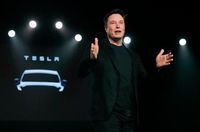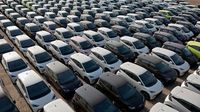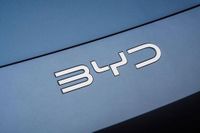In a significant move for the electric vehicle market, BYD Auto, a leading Chinese manufacturer known for its battery electric vehicles, is set to establish its UK headquarters in Denham, Buckinghamshire. This strategic partnership with ARC will bolster BYD's presence in the UK, allowing it to compete directly with Tesla, the American electric vehicle giant led by Elon Musk.
BYD, which has gained recognition for its innovative electric double-decker buses in London, has secured a lease for 27,000 square feet in Building 05 at the ARC Uxbridge campus. This location is designed to foster creativity and collaboration, featuring a co-working hub, meeting spaces, and green parkland, all aimed at creating an innovation ecosystem.
Andrew Davies, Leasing Director at ARC, expressed enthusiasm about BYD joining the community, stating, "We’re delighted to welcome BYD to ARC Uxbridge. This is an exciting addition to our vibrant community, and we’re looking forward to introducing and integrating BYD into our group-wide energy tech cluster. BYD’s innovative approach perfectly complements ARC’s innovation ecosystem." The new headquarters will focus on making public transport across Europe emission-free, aligning with global sustainability goals.
The timing of BYD's expansion is particularly fortuitous, as the company recently reported a staggering 29 percent year-on-year increase in revenue, reaching £83 billion. According to the BBC, BYD has now surpassed Tesla as the number one electric vehicle manufacturer globally, a significant milestone considering Tesla's dominance in the market since 2019.
This shift in market leadership comes amid challenges for Tesla, which has seen its sales decline in Europe and the US. Reports indicate that Tesla's sales in Europe fell by 44 percent in February 2025, while Chinese brands, including BYD, experienced an 82 percent increase in the same period. Analysts attribute Tesla's struggles to a combination of factors, including a lack of significant product updates and growing competition from companies like BYD.
Tesla's troubles have been compounded by Elon Musk's controversial political affiliations, particularly his close ties to former President Donald Trump. This relationship has reportedly alienated some of Tesla's customer base, transforming the brand from a favorite among progressive consumers to a symbol of right-wing politics. As a result, used Tesla prices have plummeted, even as interest in electric vehicles continues to rise.
BYD's ascent is also marked by its innovative product offerings. The company recently unveiled a charging system capable of delivering 250 miles of range with just a five-minute charge, a technological breakthrough that sets it apart from competitors. This system, which utilizes a Super E-Platform, can charge vehicles at speeds of up to 1,000 kilowatts, far exceeding the capabilities of most Tesla Supercharger stations.
Industry experts have lauded BYD's advancements, with Ryan Fisher, head of charging infrastructure research at BloombergNEF, stating, "The new charging performance blows the competition out of the water. It’s three to four times the charging power Tesla's can consume, and the vehicles will be similarly priced in China as the Model Y." BYD plans to introduce this flash-charge battery technology in its Han L and Tang L models as early as next month.
As BYD consolidates its position in the electric vehicle market, it faces challenges in expanding its brand recognition beyond China. While the company has seen remarkable growth in domestic sales, with new car registrations up nearly 700 percent in the UK last year, it has yet to establish a significant presence in the US passenger vehicle market. Current trade restrictions and tariffs complicate BYD's ability to penetrate this lucrative market.
Despite these hurdles, analysts believe that BYD's technological innovations and competitive pricing could disrupt the market further. The entry-level BYD electric vehicle is priced under $10,000 in China, while Tesla's Model 3 starts at approximately $32,000. Additionally, BYD recently launched a new electric sedan, the Qin L EV, which offers similar specifications to the Model 3 but at half the price, starting at $16,500.
As Tesla grapples with declining sales and a tarnished brand image, BYD's rapid rise serves as a cautionary tale for the American automaker. Musk's initial dismissal of BYD as a competitor in 2011 now seems shortsighted, as the Chinese company has not only surpassed Tesla in annual revenue but has also positioned itself as a formidable player in the global electric vehicle market.
With Tesla's stock facing significant volatility—having seen a 10 percent drop following BYD's recent announcements—investors are closely watching how this rivalry unfolds. Tesla shares began to rebound recently after Musk urged employees to hold onto their stock during an all-hands meeting, but the company remains over 40 percent off its December record high.
In summary, BYD's expansion into the UK and its technological advancements signify a pivotal moment in the electric vehicle industry. As the company continues to innovate and capture market share, the pressure mounts on Tesla to adapt and respond to the shifting landscape. With consumer preferences evolving and competition intensifying, the future of electric vehicles will likely see BYD and Tesla vying for dominance on a global scale.






